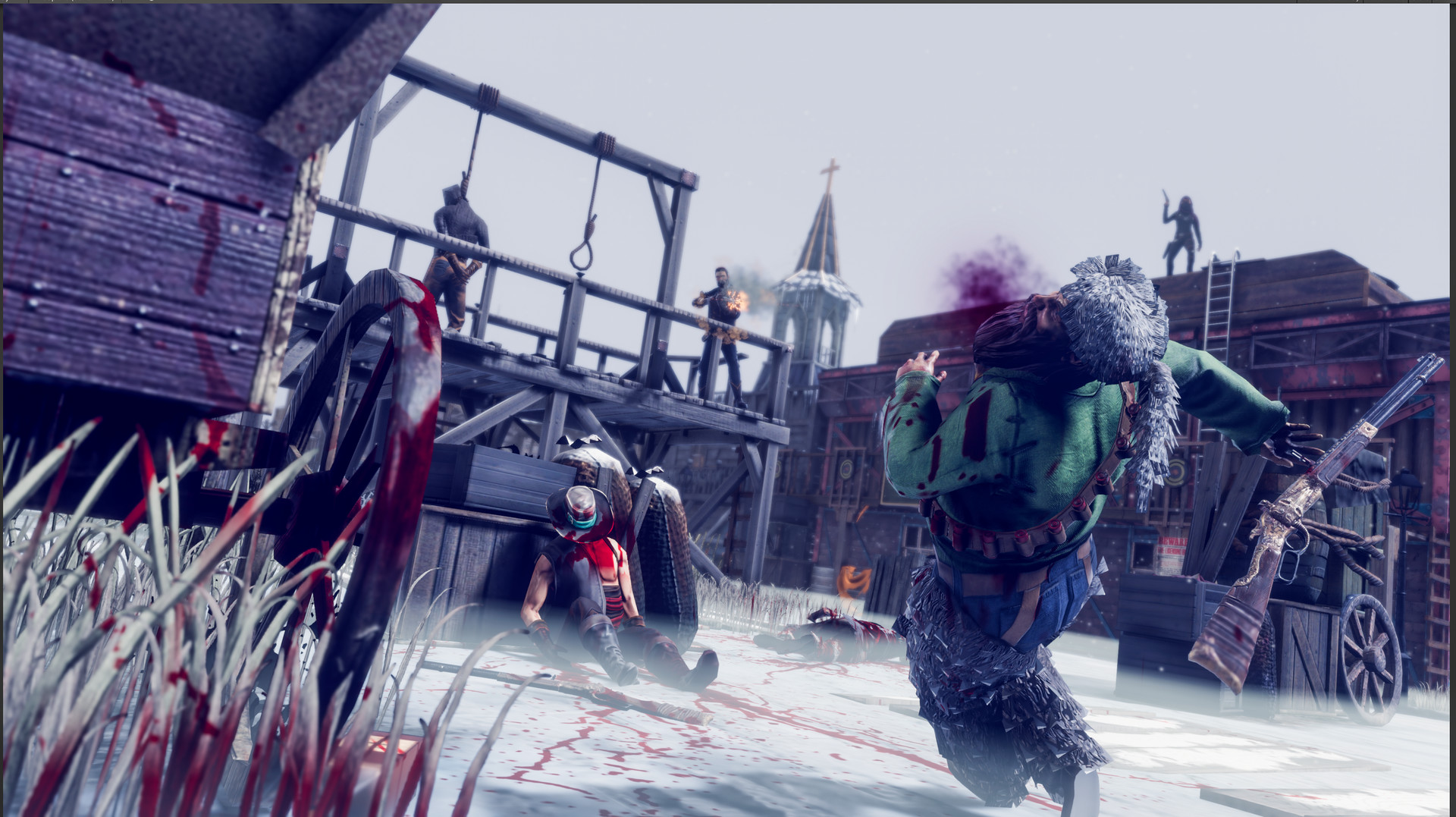Our Verdict
A superb tactics game that looks like an XCOM clone but really, really isn’t.
PC Gamer's got your back
Just about anything can be made better by the addition of the supernatural. Pirates of the Caribbean exploited a winning formula with its ghostly buccaneers, Stranger Things puts the demons in D&D, and Hard West has hit a home run with its tales of the weird wild west. An XCOM-like tactics game, except when it isn’t, Hard West 2 brings some up-to-date ideas to the poker table.
What is it? Supernatural cowboy turn-based tactics
Expect to pay: $27/£24
Developer: Ice Code Games
Publisher: Good Shepherd Entertainment
Reviewed on: Threadripper 2950X, Geforce RTX 3080 10GB, 64GB RAM
Multiplayer? No
Link: hardwestgame.com
It starts with a train, as many of the best things do. You’re robbing it, naturally, and having done your research you’re sure there aren’t many guards. ‘You’, in this case, are Gin Carter, a horse-riding, hat-wearing, six-shooter aficionado who’s the nominal leader of a band of outlaws. This train heist is gonna make him rich, you’ll see. With him are Laughing Deer, Native American melee specialist, Flynn, who appears fragile and keeps to the shadows, and trick-shooter Kestrel Colt.
The train guards don’t stand a chance, except there are more of them than you expected. Happily, you have certain advantages, which stand you in good stead throughout the game. The first is that your characters have three action points rather than the traditional two. This means they can move, heal, and still shoot. Or sprint into cover and hunker down for a better chance of evading incoming fire.
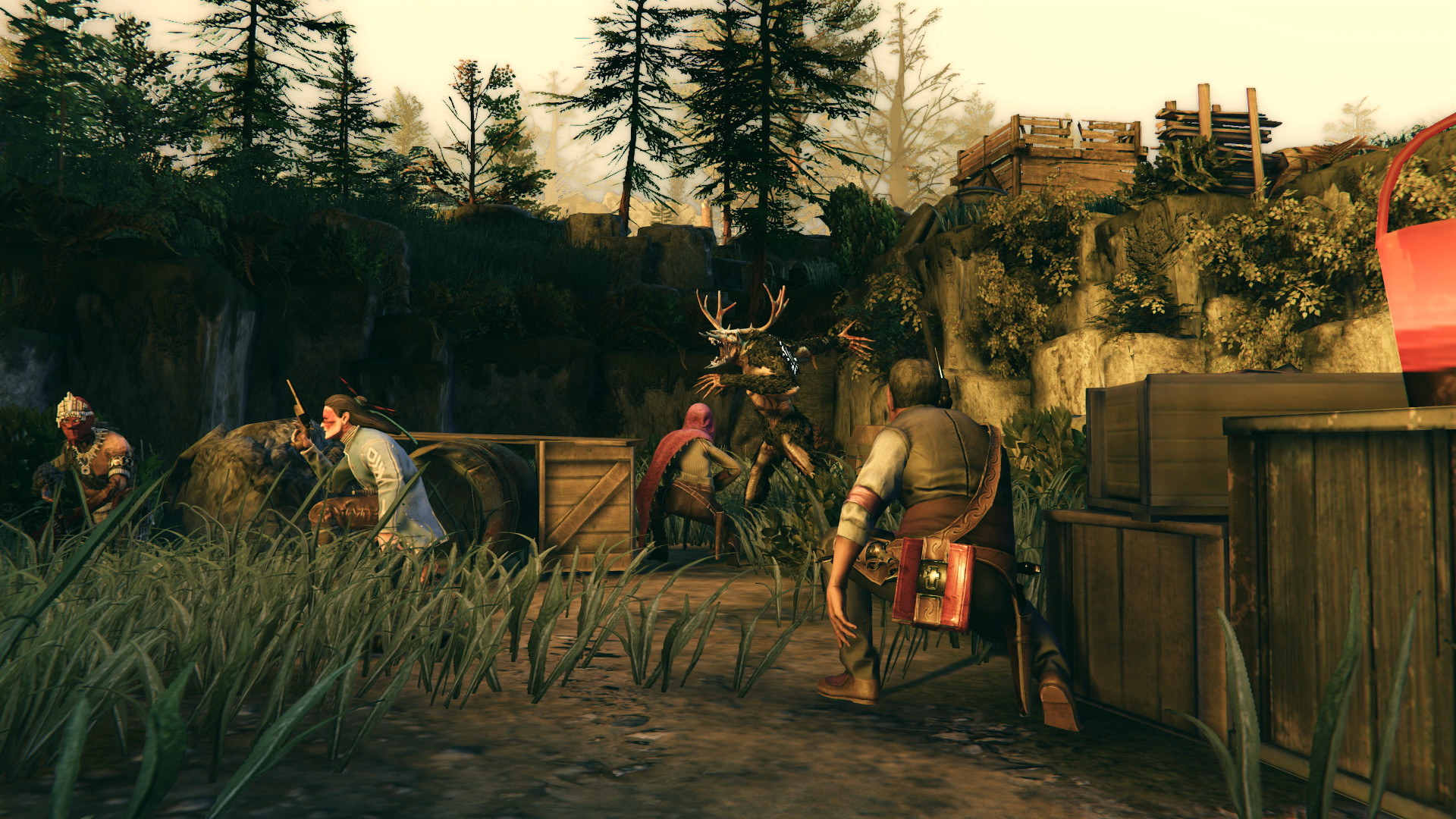
Luck of the draw
Trick shots mean ricocheting your bullets off hard surfaces to negate the effect of cover, essentially outflanking the enemy with unfairness. To facilitate this, wheelbarrows, piles of junk, and non-explosive barrels are scattered around levels. You can even ping a bullet off hanging light fittings. Then there's luck, the addition of which makes your attacks more accurate.
It’s bravado, though, that makes the biggest difference. Kill an enemy, and your action points are refilled. It’s so simple, but affects battles in such a profound way. Suddenly they’re chains to be yanked on, to see how far they go. Living enemies are stepping stones toward your objective, at the risk of overextending and getting cut to pieces the next turn, or leaving other characters behind as you take one on a killing spree.
This, at least in the early stages, means Laughing Deer is a killing machine. Get him in close, add a dose of luck, and he can club anyone to death, instantly refilling his AP to move on to the next hapless victim. Luck will eventually run out, and enemies with more health arrive, but he still hits hard. That makes it all too easy to leave him unprotected, standing miles away from cover or allies when the turn ends just because you were having too much fun tearing through bad guys.
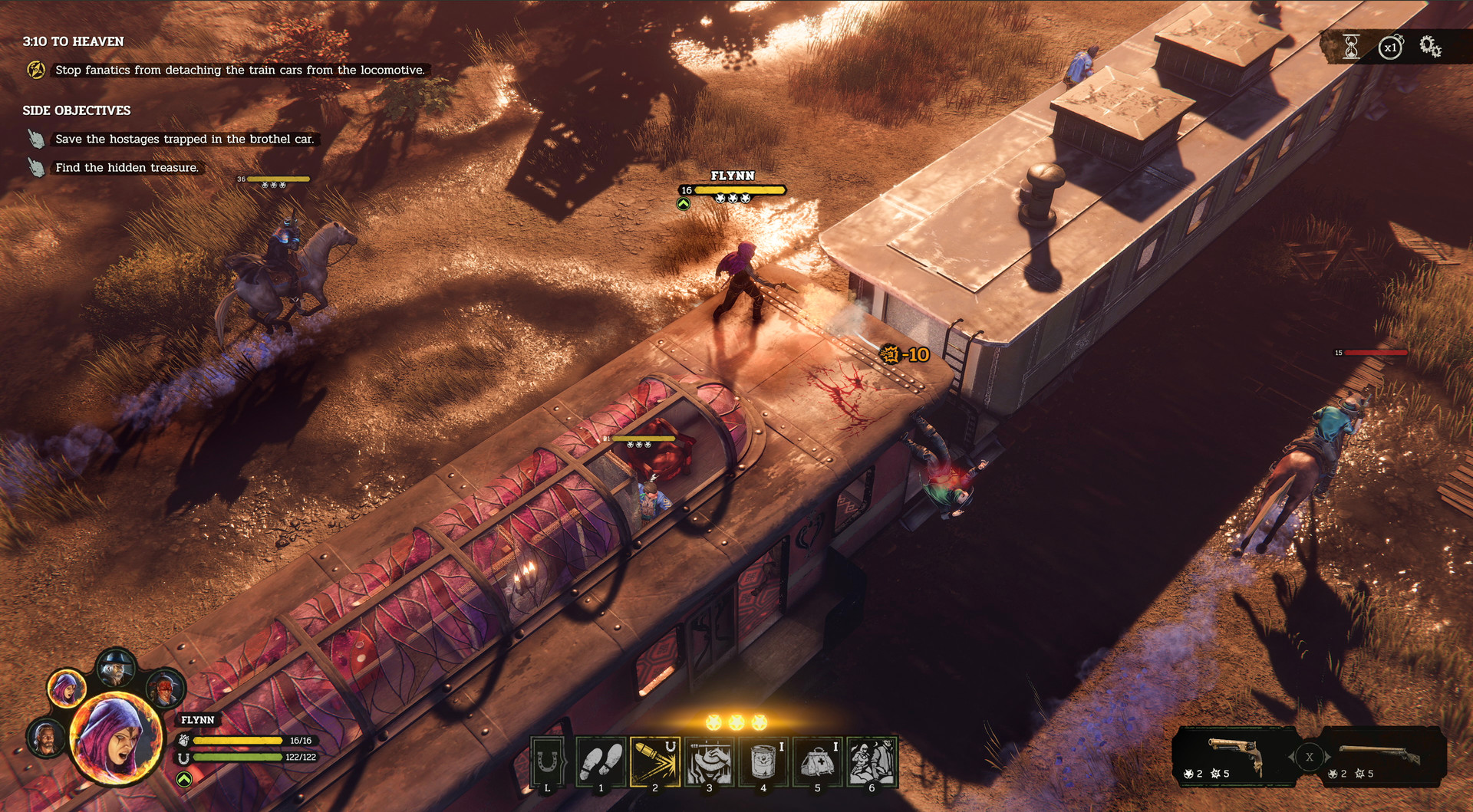
Red hot poker
Back on the train, you’ve made your way to the driver’s compartment. The loco goes into a tunnel, everything goes black. When it comes out the other side, it’s crawling on hundreds of centipede-like metal legs, which is unusual for a steam train. There, stoking the boiler, is a man who turns out to have some interesting powers of his own, eventually revealing himself to be Mammon, the devil himself. And he wants to play poker.
Of course you play. Of course you lose. The stakes were only your very soul, but if you'd won he'd have given you the centi-train, making it a very tempting offer. And he seemed like such a trustworthy guy. The loss of your soul, interestingly, stops you from casting a shadow. I'm not sure how that works.
Eventually you’ll unlock a gang of six outlaws, each with their own skills and inventory.
You wake up in the overworld map, a departure from the XCOM-like base-building globe, and something more like Total War’s strategy layer mixed with a 2D RPG. You wander around up here, discovering towns, mines, and weird things next to the road, generally getting yourself into trouble and switching to the turn-based combat mode to get yourself out of it again. You dig up (sometimes quite literally) new members of your posse with new abilities, have short conversations, make decisions like whether to take supplies or leave them for the starving villagers, and investigate the uncanny. Mammon and his centipede express to Hell are still out there somewhere, making a mockery of both timetables and 19th century engineering practices as they thunder through the countryside. Killing him could get you back your soul. It’s worth a try, anyway. And it might be fun.
For now, though, it’s cold. Heading to a town would be good, as there might be shops there to tool up on new weapons, but first we need to check out that old hut by the side of the road.
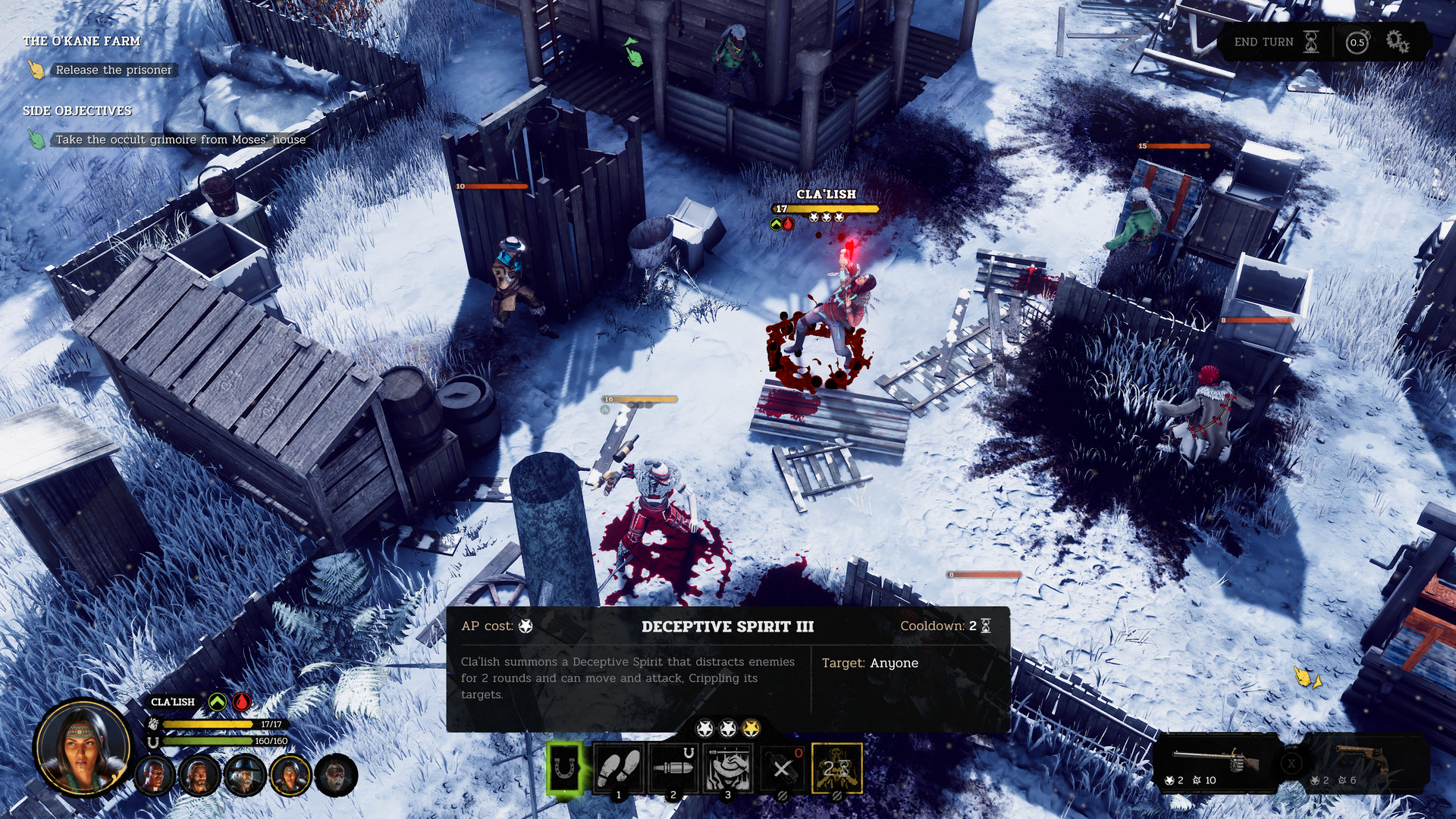
Dirty dozen
Once you’ve built up a few extra members to your posse, you can start thinking about different ways to approach missions. The game shares more with Desperados 3 than a setting and a liking for the save scumming, giving each character special abilities. Gin Carter has a short-ranged skill that can shoot through cover, damaging every enemy within its area of effect. Flynn can swap places with any character at the cost of one hit point each—great for pulling an entrenched enemy out of cover or finishing off bad guys with just a sliver of health left. Others have more eldritch endowments.
Eventually you’ll unlock a gang of six outlaws, each with their own skills and inventory, ready to tear into the riflemen, shotgunners, exploding drunks (grenade launchers with apparently infinite ammunition), zombies and witches who infest every rickety wooden structure. Hard West 2 lives up to its name, as enemies are plentiful and become pretty tough.
Replay value may be limited, as levels are more like puzzles to be solved, enemy positions not mixing up if you take another shot at them, and there's no multiplayer.
They start off killable with one shot, but pretty soon double their hit points, bringing your bravado-fuelled rampages to an end unless you spend some time softening them up first. Characters can hold two weapons, plus throwables, each of which will have a different AP cost. Rifles, for instance, take all three action points to fire, but their damage and range are unmatched. Shotguns and explosives have an area of effect, and can hurt your allies. Killing an ally, however, can trigger bravado, so perhaps it’s worth it, especially as members of your team never really die, coming back to life after the battle with one hit point ready for a trip to the surgeon, if you’ve got the cash.
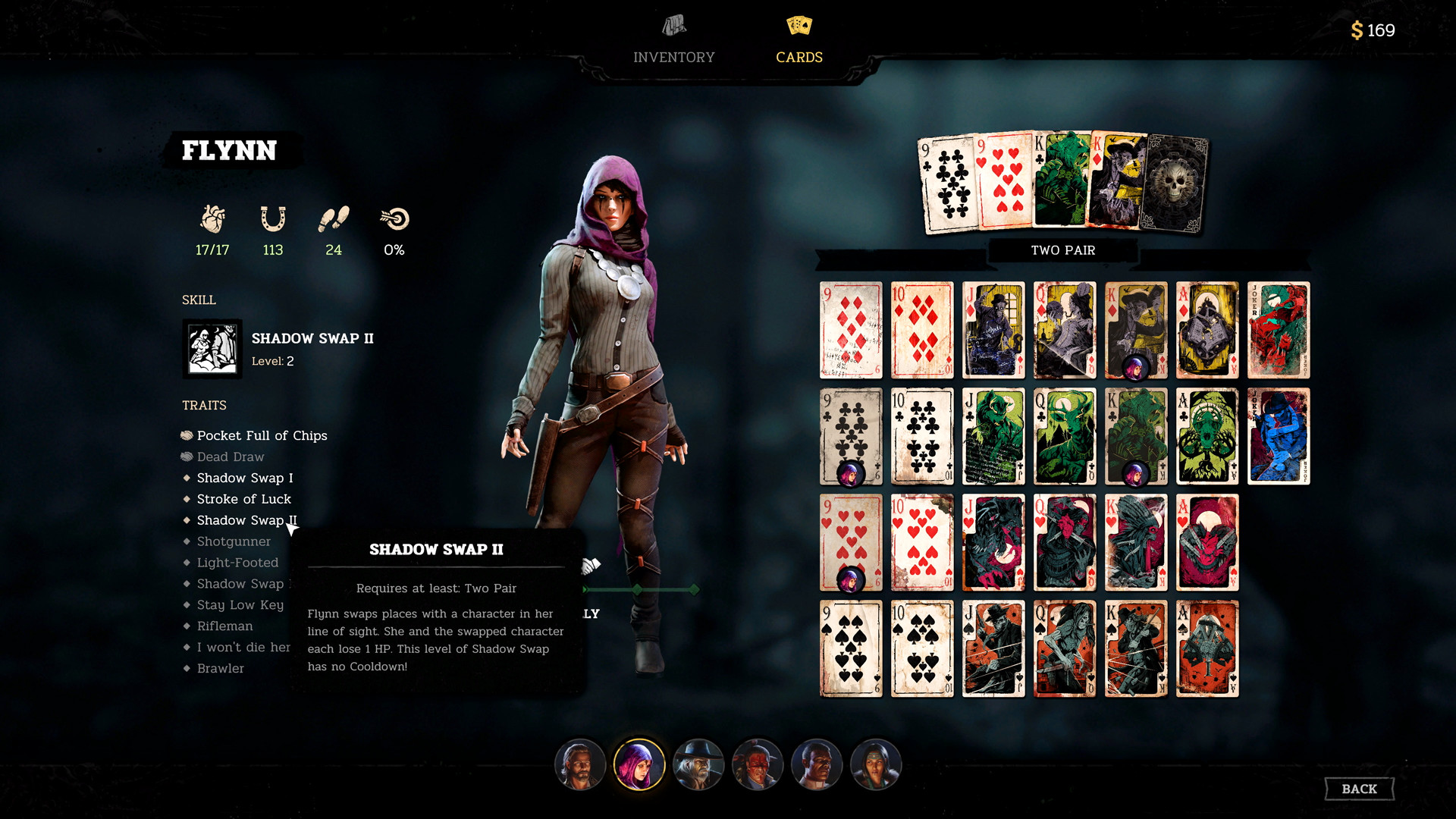
Then there are the cards, which you’ll pick up occasionally as you wander round the map. They’re normal playing cards, only slightly enchanted, and on their own can add extra hit points, luck or speed. But this is the old west, so giving a character a valid poker hand gets you something extra. Holding two pair may unlock an ability, but a full house levels it up and a royal flush makes it even better. It can help to have a poker guide or Wikipedia to hand while doling out cards, unless you’re an actual cowboy.
Take Laughing Deer: he needs to hold a pair to unlock his devastating Wild Run ability, which adds extra damage for every two squares he charges into battle. Add extra cards for a flush and an area of effect war cry is added to daze nearby enemies, while a straight flush increases base damage and gives allies a perk. Sending him zig-zagging across the level in a maximum-range killing spree among spread-out enemies, and watching the fires of bravado ignite each time he clubs another rifleman to the ground, is among one of the most satisfying sights the game has to offer.

Boom town
Less satisfying are the things you’d expect to happen but don’t. Throwing a stick of dynamite should have a devastating effect on structures, which look lightly built and tinder dry. It does not. Area of effect attacks are two-dimensional, limited to the level you’re on and not affecting those immediately above or below, something especially frustrating with shotguns, which you should be able to use to knock someone off a rooftop. And cover can’t be blown away or vaulted over, though your characters do a good job of pathfinding the rest of the time, scaling ladders and bursting through windows. Replay value may be limited, as levels are more like puzzles to be solved, enemy positions not mixing up if you take another shot at them, and there's no multiplayer.
Given time, enemies appear who have the same sort of supernatural abilities as your characters, which feels like cheating on their part as their hit points return to normal after a flurry of gunfire. Then there's the enormous amounts of explosives carried by other enemies, who like to charge in and start lobbing grenades everywhere, causing your characters to bleed their own hit points alarmingly fast. There are ways to mitigate this, of course, like using the Heads Down manoeuvre to stop the bleeding and food to build your points back up, but they all take action points.
None of that really matters though, as Hard West 2 is as solid as the safe in the township’s bank. The one the local outlaws have been making elaborate plans to rob. The combat is crunchy, the bits in-between don’t outstay their welcome, and the whole supernatural cowboy setting still has just enough shine on it to be engrossing. There's more than enough room in our town for a game like this.
A superb tactics game that looks like an XCOM clone but really, really isn’t.

Ian Evenden has been doing this for far too long and should know better. The first issue of PC Gamer he read was probably issue 15, though it's a bit hazy, and there's nothing he doesn't know about tweaking interrupt requests for running Syndicate. He's worked for PC Format, Maximum PC, Edge, Creative Bloq, Gamesmaster, and anyone who'll have him. In his spare time he grows vegetables of prodigious size.
